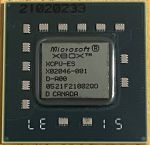Waternoose
 DD1.0 | |
| File:X02046.jpg DD2.1 (X02046) | |
| File:X806416.jpg DD2.1 (X806416) | |
| Part Number | X02046 X806416 |
|---|---|
| Introduced | 2005 |
| Designed By | IBM Microsoft |
| Type | XCPU |
| Used In | Xenon Zephyr |
| Clock Speed | 2.8-3.2GHz |
| Cache | L1: 32KB/32KB L2: 1MB |
| Instruction Set | PowerPC RISC |
| Cores | 3 |
| Threads | 6 |
| Process | 90nm |
| TDP | 85W (DD1.0/DD2.0) 75W (DD2.1) |
| Package | Flip-chip BGA899 |
| Successor | Loki |
The Waternoose series are the original production model of the XCPU used in the Xbox 360. They have 75-85W TDPs and are manufactured on the 90nm process.
Specifications
- 3 two-way SMD-capable RISC cores clocked at 3.2GHz
- SIMD: Two VMX128 units
- 32KB L1 data cache
- 32KB L1 instruction cache
- 1MB L2 cache at 1.6 GHz with a 256-bit bus
- 21.6GB/s FSB
- 768 bits of IBM eFUSE One-Time-Program memory for fusesets
- One-Time-Programmable ROM and 64KB SRAM for the 1BL and Config Ring
- Big-endian architecture
- 90nm process
- TDP:
- 85W (DD1.0/DD2.0)
- 75W (DD2.1)
Details
DD1.0
DD1.0, is the engineering sample of the XCPU, labelled XCPU-ES. It runs at 2.8GHz as opposed to the final speed of 3.2GHz. The ROM does not contain a 1BL, and thus these CPUs can only boot with a Titan board, which injects the 1BL. It still has the original Xbox logo as it was created before the Xbox 360 name was chosen.
- Part Number: X02046-001
- Foundry: Canada Foundry
DD2.0
DD2.0, is the production version of the XCPU running at 3.2GHz. There are 2 versions of the chip with different part numbers. It is not known what the difference between these two chips are. It also contains a programmed ROM containing the 1BL. Versions with part number X02046-002 used in certain pre-final consoles were still labelled "XCPU-ES" and still had the original Xbox logo.
- Part Numbers:
- X02046 (except -001)
- X806416
- Foundries:
- Canada Foundry
DD2.1
DD2.1 is a revision of DD2.0, with the notable change of reducing the TDP to 75W from the initial 85W.